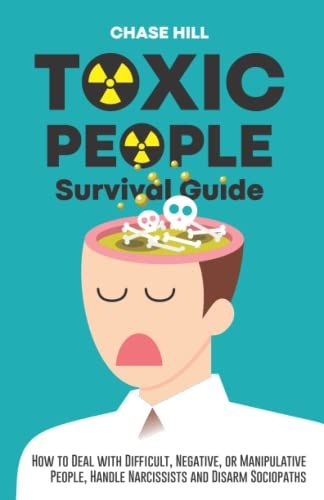Prolific self-help author Chase Hill offers a basic primer for recognizing the harmful behaviors of others and taking steps to protect your emotional life.

Protect Yourself from Toxic People
Toxic people drain you of your energy, confidence and sense of self. Failing to recognize and deal with the toxic people in your life can lead to depression, social withdrawal and chronic pain, says life coach and prolific self-help author Chase Hill. His guide highlights toxic people’s red flags and teaches you tactics to better deal with them.
Identifying Toxic Behavior
People who intentionally manipulate others and refuse accountability are toxic. They are often liars, control freaks, gossips or people who love to stir up trouble. Several factors trigger toxic behaviors, including chemical imbalances in the brain, personality disorders, stress, and an individual’s predisposition toward pessimism or envy. But not all toxic people are toxic intentionally. Many people develop toxic habits as a defense mechanism during childhood. Toxicity lies on a spectrum.
Hill suggests reflecting on your own behavior before analyzing others’. Do you display negative qualities that exacerbate unhealthy relationship dynamics? Maybe you spread rumors, ruminate on the past, or have a cynical attitude. Perhaps you’ve hurt someone’s feelings in the past, triggering his or her stress response, which means your behavior was toxic for that person. If so, make amends and admit your mistakes.
Love is blind – even to toxic behavior.Chase Hill
Could your spouse or partner be toxic? You may not realize because toxic behavior is often subtle initially and builds gradually. If you cannot communicate without sarcasm, argument or bitterness; if you feel unsupported, jealous or resentful; if your partner fails to consult you about important financial decisions; if your relationship lacks balance; if you no longer take care of yourself or enjoy your hobbies; or if your partner ridicules you in front of others, consider whether your partner is toxic.
Sociopaths
A sociopath is someone “who is completely unable or unwilling to behave in a way that is acceptable to society.” Sociopaths struggle to connect emotionally. They act impulsively, frequently lose their tempers and always try to justify their antisocial behaviors. Beware some red-flag behaviors: impulsivity, an absence of empathy, aggressive or threatening behavior to exert control, lying for personal gain, manipulating with charm, partaking in violent crimes or theft, shrugging off work-related responsibilities, and abusing alcohol or drugs.
Don’t try to help sociopaths or confide in them. They’ll use your secrets as ammunition.
Narcissists
People with narcissistic personality disorder (NPD) believe they are more important than others, and they expect special treatment. They crave attention, lack empathy and strive for perfection. They become envious of anyone who receives praise or succeeds. But behind their overconfident facade lies a fragile sense of self-worth. They mask their shame and insecurity, and they often display anger issues, controlling behavior and impatience.
When living with a narcissist, you have to cope with the constant feeling that you will never be as good as or equal to that person.Chase Hill
Narcissism exists on a spectrum. Most people exhibit a healthy amount of narcissism – for example, pride in a job well done – so don’t glibly label someone a narcissist.
To deal with narcissists, Hill advises, erect boundaries and establish consequences when they cross a line. Don’t play their emotional games or allow them to manipulate you with shame, blame or guilt. And don’t expect them to change.
Manipulation
Effective manipulators, Hill explains, have personalities containing elements of narcissism, psychopathy and Machiavellianism. Their behavior includes lying, love flooding, withholding affection, and engaging in reverse psychology. To test whether someone is manipulating you, consider whether you are complying with someone because you want to or because you want to avoid backlash?
Not everyone is out to manipulate you, but life will become more pleasant when you can identify the behavior and master how to handle it.Chase Hill
Remember you have a right to turn down requests. Remind yourself that all human beings are free and equal. If toxic people make you feel as though they’re superior, or that their needs matter more than yours, know that they don’t deserve any more than you do. Distance yourself from toxic people who don’t recognize the validity or your needs. Erect boundaries and enact consequences for manipulation, such as walking away when your partner starts yelling. Practice declining requests using firm phrases, such as “I’m not comfortable with that.”
Speaking to a Bully While Retaining Power
Keep your conversations brief and unemotional. Don’t get defensive. Remind yourself that your boundaries are non-negotiable. Use strong power phrases, such as, “I will not tolerate you insulting me” and “It bothers me when you criticize me in front of others.” Toxic people suffer low self-esteem, so use affirming responses when dealing with issues that aren’t important to you, such as, “I agree with you” and “You’re right.” Avoid using the words “never,” “always” or other extreme adverbs that the toxic person might construe as exaggeration on your part.
Overcome Negativity
Toxic behavior is contagious, suggests Hill. Proximity to toxic people may lead you to begin, for example, telling lies to avoid altercations. Avoid situations that trigger the other person’s toxic behavior. Or try seeing the person only in group settings or cutting all ties completely. Spend time with people who put you in a positive frame of mind. Don’t hold on to pain. Confide in a good friend or a journal to relieve yourself of your mental burden.
Engage in activities that help you relinquish negative feelings. Eat well and nourish your body. Exercise regularly and schedule time for enough sleep. Hill advises focusing on your skills and passions. Choose three adjectives that embody the best version of yourself – for example, independent, capable and creative – and repeat those words like a mantra when you need a boost.
Toxic Behavior Survival Guide
Chase Hill’s guide to toxic behavior suffers from repetition, especially when Hill offers solutions for restoring self-worth. But he writes in a breezy, conversational style that enables readers to, at the very least, gain clear markers of unacceptable behavior. And for those readers, Hill’s basic tactics of self-acceptance and resisting manipulation will prove worthwhile, if only for his clear explanations and advice.












